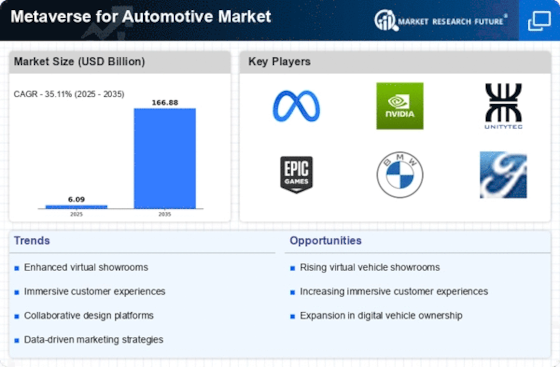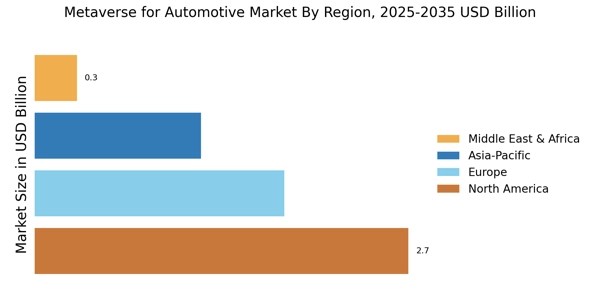Innovative Marketing Strategies
The Metaverse for Automotive Market is increasingly influenced by innovative marketing strategies that leverage virtual environments. Automotive brands are exploring new avenues to connect with consumers through immersive storytelling and interactive content. By utilizing the Metaverse, companies can create unique marketing campaigns that resonate with tech-savvy audiences. For instance, virtual car launches and interactive advertisements are becoming commonplace, allowing brands to showcase their vehicles in a captivating manner. This shift towards experiential marketing is supported by data indicating that 70% of consumers prefer brands that offer interactive experiences. As a result, the Metaverse for Automotive Market is likely to see a rise in investment in these innovative marketing approaches, ultimately enhancing brand loyalty and consumer engagement.
Collaboration with Tech Companies
The Metaverse for Automotive Market is characterized by increasing collaboration between automotive manufacturers and technology companies. This partnership aims to harness cutting-edge technologies such as artificial intelligence, blockchain, and VR to enhance the automotive experience. By integrating these technologies into the Metaverse, automotive brands can offer personalized experiences, streamline operations, and improve customer service. For example, partnerships with tech firms have led to the development of advanced virtual showrooms and AI-driven customer support systems. This collaborative approach is expected to drive innovation within the Metaverse for Automotive Market, as companies seek to differentiate themselves in a competitive landscape. The potential for enhanced operational efficiency and customer satisfaction through these collaborations is substantial.
Increased Demand for Immersive Experiences
The Metaverse for Automotive Market is witnessing a surge in demand for immersive experiences among consumers. As technology advances, customers increasingly seek interactive and engaging ways to explore automotive products. This trend is reflected in the growing popularity of virtual reality (VR) and augmented reality (AR) applications, which allow potential buyers to experience vehicles in a simulated environment. According to recent data, the market for VR in automotive is projected to reach USD 1.5 billion by 2026, indicating a robust growth trajectory. This heightened interest in immersive experiences is likely to drive automotive manufacturers to invest in Metaverse technologies, enhancing customer engagement and satisfaction. Consequently, the Metaverse for Automotive Market is poised for significant expansion as companies adapt to these evolving consumer preferences.
Sustainability and Eco-Friendly Initiatives
The Metaverse for Automotive Market is increasingly aligning with sustainability and eco-friendly initiatives. As consumers become more environmentally conscious, automotive brands are exploring ways to reduce their carbon footprint through virtual solutions. The Metaverse offers a platform for showcasing electric vehicles and sustainable practices without the need for physical resources. Data suggests that the market for electric vehicles is expected to grow at a CAGR of 22% through 2030, indicating a shift towards greener alternatives. By leveraging the Metaverse, automotive companies can promote their eco-friendly initiatives and engage consumers in meaningful ways. This alignment with sustainability is likely to enhance brand reputation and attract environmentally conscious consumers, further driving growth in the Metaverse for Automotive Market.
Enhanced Data Analytics and Consumer Insights
The Metaverse for Automotive Market benefits from enhanced data analytics and consumer insights derived from virtual interactions. As consumers engage with automotive brands in the Metaverse, companies can collect valuable data on preferences, behaviors, and trends. This information enables manufacturers to tailor their offerings and marketing strategies to better meet consumer demands. The ability to analyze real-time data from virtual environments allows for more informed decision-making and product development. Furthermore, the integration of data analytics into the Metaverse can lead to improved customer experiences, as brands can anticipate needs and preferences. This focus on data-driven strategies is likely to propel the Metaverse for Automotive Market forward, as companies leverage insights to enhance their competitive edge.

















